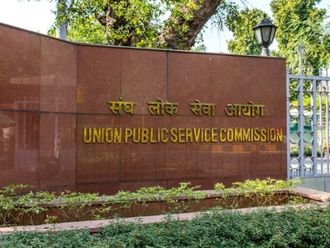
A desperate realism over the continuing violence in Syria is changing some of the attitudes of regional forces. The conversations between Russia, with both the UAE and Saudi Arabia on the fringes of last week’s Russian Grand Prix in Sochi, show how the supporters of the opponents of Syrian President Bashar Al Assad are now willing to talk to one of Al Assad’s most effective allies.
The search for a political solution is why His Highness Shaikh Mohammad Bin Zayed Al Nahyan, Abu Dhabi Crown Prince and Deputy Supreme Commander of the UAE Armed Forces, met Russian President Vladimir Putin.
After the meeting he said that the UAE will make every effort required to back political solutions that would safeguard the security and stability of Syria, as well as its territorial integrity.
Shaikh Mohammad added that there was an urgency to the Syrian crisis because it has claimed the lives of hundreds of thousands of Syrians, displaced millions of innocent people, as well as caused the loss of years of human and economic development.
Priorities
The Al Assad regime is backed by Russia and also Iran, which Saudi Arabia and the UAE consider a major threat to regional stability, as Iran seeks to foment discontent in a variety of counties including Yemen, Iraq and Lebanon.
So it was surprising that the Gulf states wanted to talk to the Russians, but they have two important priorities in Syria. One is to find an end to the civil war; the other is to wipe out Daesh (the self-proclaimed Islamic State of Iraq and the Levant). These two tasks are linked but are different.
Ending the war requires a desire for a political settlement between the main Syrian militias, which requires support from Al Assad’s allies. Russia must be willing to help find an end to the fighting as it looks at its wider Middle East strategy.
It has been locked out of the Arab world for decades, and Putin wants Russia to have a more significant role in the region. Therefore, he will want to engage with as many regional powers as possible to expand Russia’s presence from its current narrow regional presence as Al Assad’s ally.
In this context, Russia will not want to continue to be part of a war in Syria against forces backed by some of the Arab world’s leading nations, which has greatly harmed Russia’s ability to make new alliances. But any rapprochement has a long way to go.
Saudi Arabia’s Defence Minister Prince Mohammad Bin Salman Al Saud also met Putin last week and after that meeting, the Russians rushed to say that both Saudi Arabia and Russia have a similar objective, which is not to let a terrorist ‘caliphate’ take over Syria. But Prince Mohammad was a lot more measured when he spoke after the meeting.
Prince Mohammad expressed Saudi Arabia’s deep anxiety over Russia’s new military intervention in Syria, and over Al Assad’s alliance with Iran. He did agree that Saudi Arabia was in favour of a political solution in Syria, but he maintained that this required the departure of Al Assad.
Room for manoeuvre
There may be some room for manoeuvre over this if the compromise that was outlined by many others — including United States Secretary of State John Kerry — comes into play, under which everyone agrees that Al Assad must go, but not immediately and they agree that he can remain as part of an interim regime.
The fight against Daesh is a different matter and while everyone agrees Daesh must be wiped out, not much has happened to make that happen. The international coalition has been trying to support the government in Iraq against Daesh, but with no great success, and while it has run some air raids against Daesh in Syria, it has refused to back Al Assad in that struggle and has no ground forces with which to fight Daesh.
Daesh forces have become one of the more successful militias in Syria and they now control much of the centre and east of the country. The very small American backing of the Free Syrian Army (FSA) did not get very far and anyway the FSA wants to focus on fighting Al Assad, not Daesh.
As a result, it has turned out that the most effective combatants against Daesh have been the Kurdish militias of north Syria, the People’s Protection Units, YPG, which are under the control of the Democratic Union Party (PYD), part of the Kurdish Workers Party, PKK, which seeks autonomy for Kurds in Turkey.
So the Americans started by not wanting to be involved in the Syrian civil war, then ineffectively backed the FSA, which then started to ally itself and be taken over by the Islamist Jabhat Al Nusra and others.
This left the Americans with little to do other than help the Kurds, who are roundly hated by America’s Nato ally Turkey. It is this confused tale of woe that has created the power vacuum into which Russia has jumped with such vigour.








